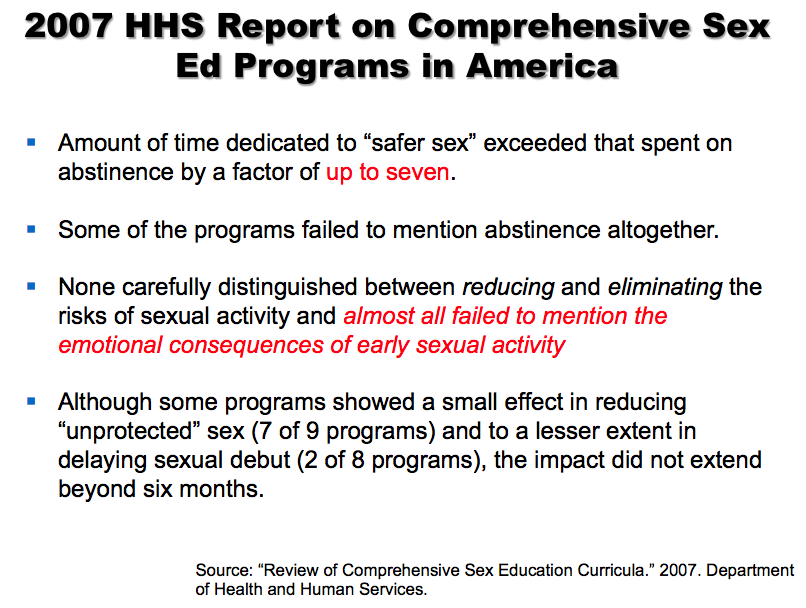Gender & Sexuality
Abstinence-based sex education (Sexual Risk Avoidance)
Comprehensive Sex Education (Sexual Risk Reduction)
- New Atlantis Fall 2016 - This review of peer-reviewed published research takes a big-picture look at the current state of scientific research concerning human sexual preference and gender. The overall takeaways are as follows:
- There is no compelling evidence of a biological basis for sexual orientation or transgenderism.
- Sexual orientation can change over one's lifetime.
- Non-heterosexuals are more likely to have experienced abuse as children.
- Non-heterosexuals have poorer mental health outcomes, including inceased depression, substance abuse, suicide
- There is evidence for social stress/stigma leading to at least some of the negative mental health outcomes.
- The idea that gender is an innate, fixed characteristic that can diverge from one's biological sex is NOT supported by science.
- Most children who experience gender dysphoria will come to accept their biological sex after going through puberty.
- Adults who undergo sex reassignment continue to have high suicide rates.
- There is little evidence to support the therapeutic value of puberty blockers.
- Some children do experience psychological relief from being affirmed in their cross-gender identification
- Psychotherapy for Unwanted Homosexual Attraction Among Youth
- Growing Pains: Problems with Puberty Suppression in Treating Gender Dysphoria
- CDC report on extreme risks of homosexual sex in minority communities
- CDC report on negative health behaviors in sexually-active LGBT youth
Abstinence-based sex education (Sexual Risk Avoidance)
- https://jamanetwork.com/journals/jamapediatrics/fullarticle/382798
- Ascend white paper - Presents 24 peer-reviewed studies showing the effectiveness of sexual risk avoidance education
- CDC report affirms that youth who remain virgins fare best in terms of healthy behaviors
Comprehensive Sex Education (Sexual Risk Reduction)
- 2007 Report on Comprehensive Sex Education Programs - Report by US Health and Human Services. The comprehensive sex ed programs evaluated had some success increasing condom use (small effect in 7 out of 9) and less success delaying sex (2 out of 9). Neither effect lasted beyond 6 months.
- 2016 Evaluation of Teen Pregnancy Prevention Programs - Peer reviewed evaluation of federally-funded sex ed programs, conducted by the Office of Adolescent Health (OAH) under Health and Human Services (HHS). Notably, 90% of funding went toward comprehensive sex ed, but only 15% of those programs showed positive results compared to a non-treatment group. Some programs led to worse outcomes than the non-treatment group.
